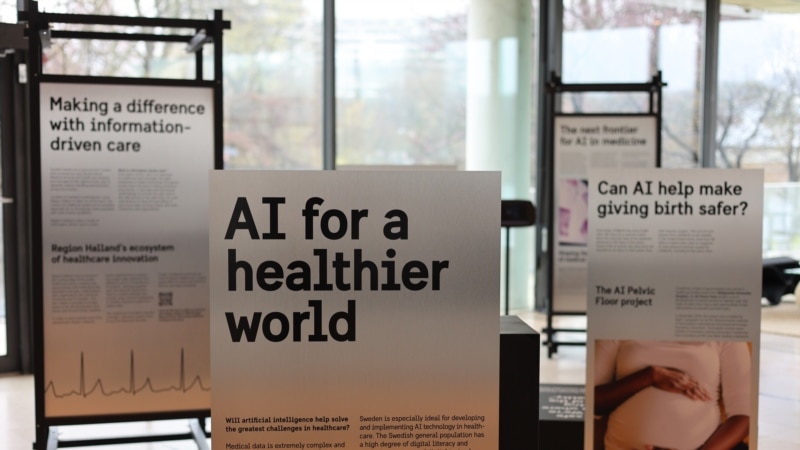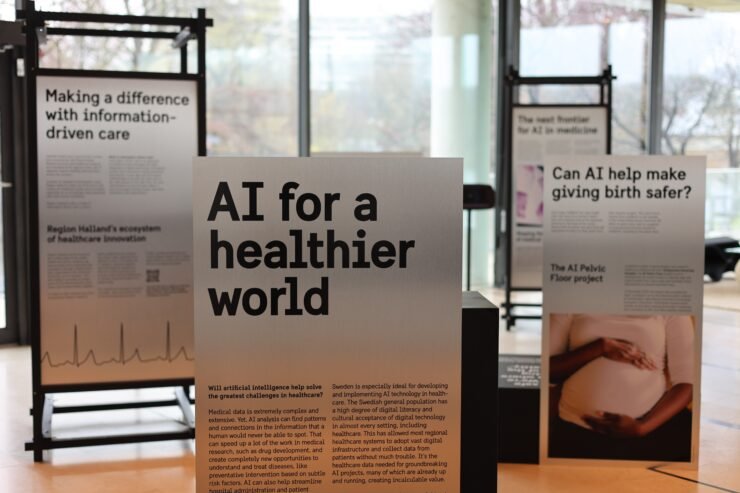In the heart of Washington, D.C., the Embassy of Sweden is currently hosting an innovative exhibition that shines a spotlight on the altruistic side of artificial intelligence (AI). This showcase vividly illustrates how Swedish enterprises and institutions are harnessing AI to foster societal openness, enhance global health, and advance environmental sustainability.
Ambassador Urban Ahlin, addressing attendees at an embassy reception, highlighted Sweden’s unique position at the forefront of integrating AI for the public good. He attributed this leadership to the country’s comprehensive collaboration among its industries, academic circles, and governmental bodies. Sweden’s AI initiatives span a broad spectrum, including advancements in clean technology, social sciences, medical research, and the development of eco-friendlier food supply chains. One of the more intriguing applications involves monitoring the wellbeing and mood of dairy cows through innovative technology.

A standout exhibit is the “Fitbit for cows,” developed by DeLaval, a leading manufacturer of dairy and farming equipment. Market Solution Manager for North America, Joaquin Azocar, explained that this compact, wearable device, which resembles an earring, is designed to fit snugly in a cow’s ear. It tracks the animal’s movements around the clock, akin to a Fitbit. These ear tags emit signals to farm-wide receivers, and DeLaval’s AI system analyzes this data to identify patterns, trends, and deviations in animal behavior. This technology enables early detection of health issues, such as illness or poor feeding habits, allowing for quicker intervention and reduced recovery times.
AI and Healthcare
Moreover, the exhibition delves into AI’s role in improving human health outcomes. One of the showcased innovations is the Pelvic Floor AI project, a pioneering AI solution developed by gynecologists and women’s health professionals at Sweden’s Sahlgrenska University Hospital. This project aims to identify high-risk cases of pelvic floor injury during childbirth, enabling timely interventions to prevent and mitigate damage.
Beyond healthcare, the exhibition also explores AI’s potential to tackle environmental challenges. For instance, AirForestry is developing autonomous forestry technology that selects and harvests trees with precision, enhancing carbon sequestration and ecosystem resilience.
However, the application of AI in defense industries raises ethical considerations. The exhibit acknowledges the complexities and necessitates a thoughtful approach to AI deployment, underscoring the importance of research and ethical standards in shaping the technology’s future.
Privacy concerns, particularly in the context of video surveillance, are also addressed. Quentin Black, an engineer with Axis Communications, discussed how the company is innovating AI-driven solutions to balance surveillance needs with privacy rights, inspired by the EU’s General Data Protection Regulation (GDPR). The Axis Live Privacy Shield, for example, employs AI to anonymize individuals in real-time video feeds, offering different levels of privacy protection.
The Future with AI is fast shaping
The Swedish exhibition underscores AI’s vast potential and its implications for society. It presents a nuanced perspective on AI, beyond the binary views of fear or unfettered enthusiasm, inviting a more thoughtful and informed discourse on the technology’s role in our lives.
As AI continues to evolve, its impact on our world becomes increasingly significant. This exhibition not only showcases the innovative ways AI is being applied for the greater good but also prompts a broader reflection on the ethical, social, and environmental dimensions of AI development. By fostering a balanced and critical conversation about AI, we can better navigate its complexities and harness its potential to address some of the most pressing challenges facing humanity and the planet.
Creating a new technology or gadget is one challenge, and making it accessible through mass production for mass market adoption is another feat in itself. While not true for all innovation, however unfortunately, most new and exciting technologies that we see or hear about in the news fails to reach a value proposition for mass adoption.
Companies are now focusing on CX AI tech, and that is not costly.
What I want to find out is if this is just short lived craze or does this actually have any potential for businesses to adopt. Most importantly can it be mass produced?
The more technologies like these become mainstream and can me mass marketed, it will drive down costs and improve products adoption.
It is intriguing how this is evolving and impacting our lives.
I try to blog about science and technology related articles on my website, one for referencing back when you are writing something or researching, and two to share with everyone.
If you like this story you should check out some of the other stories in the technology category
If you are a tech enthusiast and feel that you can contribute to this topic feel free to reach out to me.
To check the original story Click here







